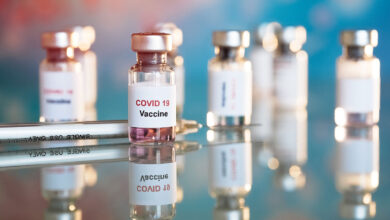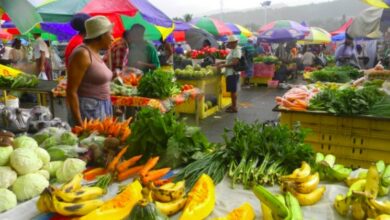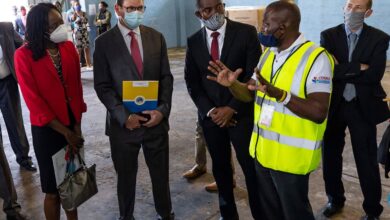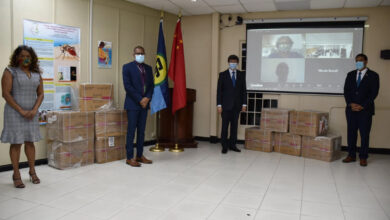Chair, thank you for the floor.
This statement is delivered on behalf of the Caribbean Community (CARICOM) Group. At the outset, we wish to associate with the statement delivered [to be delivered] by Jamaica on behalf of the OACP.
The Member States of CARICOM commend you, Mr. Chairman, for convening this Special Virtual Meeting of the General Council amidst the global COVID-19 pandemic. We also take this opportunity to express solidarity with all WTO Members, none of which has been spared the impact of the pandemic.
The Caribbean Public Health Agency (CARPHA) upgraded the risk of further disease transmission to the Caribbean Region to Very High in March 2020. As of 6 May, there were 14,184 confirmed cases in the Caribbean and 603 reported deaths. While the virus itself is a public health pandemic, its impact has extended to just about every facet of life across CARICOM, further exposing the acute vulnerabilities already facing the region.
As is the case with all WTO Members, the COVID-19 health crisis is having a profoundly damaging impact on the economic stability of the CARICOM region. Complicating the region’s policy response are a host of constraints such as a fragile macroeconomic climate and high levels of external debt, much of which was contracted in response to natural disasters. The ongoing shock is expected to worsen the fiscal accounts due to a steep decline in revenues and reduced tax receipts. Nevertheless, there is recognition that a large fiscal effort is needed to mitigate the effects of COVID-19 and to support vulnerable populations, households and businesses.
CARICOM Member States are among the most vulnerable to external shocks being particularly susceptible to natural disasters and external economic shocks. Hence, the economic prospects of our region are tied to the fortunes of others. In this regard, one of the main shock transmission channels has been the tourism sector, which is a primary driver of economic activities and a key source of foreign exchange earnings. This sector depends heavily on demand from key markets such as the United States, Canada, the United Kingdom and the European Union.
The pandemic is also laying bare the region’s vulnerabilities with respect to food and nutrition security. Notwithstanding CARICOM’s food production potential, it remains a net food importing region with over 70 per cent of all food consumed originating outside the region. Hence, the availability and accessibility of food to our populace is also fundamental to mitigating the adverse health and economic impact of this pandemic.
While the food supply in CARICOM is currently stable, we fear that the extended period of the pandemic will increasingly place global food supply chains under pressure and by extension, reduce supplies or raise prices of key products. To this end, one of the short-term areas of focus of CARICOM is to maintain the integrity of global and regional food supply chains. Therefore, CARICOM Member States are drawing up national food security plans and engaging the private sector to shore up food supplies. Critical to this effort is the bolstering of intra-regional transportation and trade facilitation.
This crisis has also revealed the importance of providing public support in building resilience and satisfying the long-term food security needs of small vulnerable economies.
The CARICOM Group therefore urges restraint as it relates to the imposition of export restrictions by WTO Members. The Caribbean Community is particularly concerned about the use of such measures on medical supplies and personal protective equipment necessary for combating the virus as well as on basic food products vital to the health and wellbeing of our populations. We have noted with alarm that some key medical supplies needed to fight the pandemic are now only available on very short-term contracts and that contract prices are subject to significant fluctuations. We therefore reiterate our call on Members to help reduce the level of uncertainty that already surrounds this pandemic by refraining from imposing export restrictions – particularly as they relate to items necessary for combating the virus, and food products vital to the health and wellbeing of other Members. Such measures will only result in price hikes and encourage excessive speculation in international markets.
Further, CARICOM’s Ministerial Council for Trade and Economic Development (COTED), meeting on 6 May 2020, voiced concern over the use of export restrictions at this time, noting that this will only exacerbate the situation and make it more difficult to fight the pandemic. In this respect, we are in solidarity with the submission by the LDC Group (WT/GC/211, dated 4 May 2020) which called upon Members to refrain from imposing export restrictions on key medical supplies and basic food products during this and future health emergencies. As small vulnerable economies, CARICOM shares similar perspectives.
Finally, Mr. Chairman, we recognize that, although the work of the WTO has been severely hampered as a result of the pandemic, the role of this organization is now more indispensable than ever in ensuring that our inter-connected world responds to this crisis, through trade and trade related measures, that secures the health and economic interests of all. We must also emphasize that our ability to participate in meetings, virtual or otherwise, and especially any kind of negotiations, decision- making or not, will be severely hampered given the challenges of COVID-19 in our capitals, as key decision makers increasingly focus on the economic downturn as well as communication technology limitations.
Chair, I thank you.






